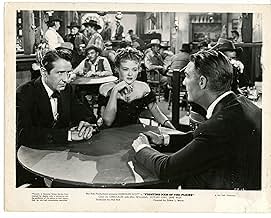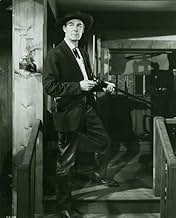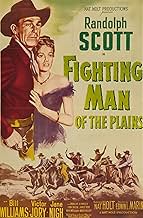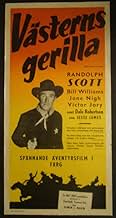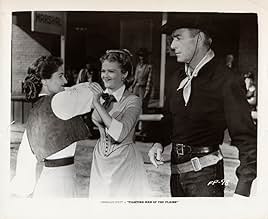अपनी भाषा में प्लॉट जोड़ेंFormer bandit Jim Dancer becomes marshal of a Kansas town and cleans up the criminal element--with help from an old pal, Jesse James.Former bandit Jim Dancer becomes marshal of a Kansas town and cleans up the criminal element--with help from an old pal, Jesse James.Former bandit Jim Dancer becomes marshal of a Kansas town and cleans up the criminal element--with help from an old pal, Jesse James.
फ़ीचर्ड समीक्षाएं
In Fighting Man of the Plains Randolph Scott is a former member of Quantrill's Raiders who kills Barry Kelley's brother during the Civil War and Kelley is hot to get him. He privately hires the Pleasanton (Pinkerton) Detective Agency to track him down. Pleasanton man James Millican does succeed in capturing Scott after several years.
But a funny thing happens on the way back. Millican gets himself killed and Scott takes his identity. As a Pleasanton Man with law enforcement experience and being fast on the draw in any event, he's a natural to bring some law and order to the new trail town of Lanyerd, Kansas. Of course Randy gets himself hip deep in the various political factions and even runs across his old enemy, Barry Kelley.
It's a rather complex situation, but the writers did come up with an interesting resolution of the plot for Randy. It does involve Scott having good friends in low places.
Fighting Man of the Plains was the first film where Dale Robertson got noticed and Dale plays real life Quantrill veteran Jesse James. You could tell that Dale was going to have a substantial career.
Best performance in the film however without a doubt is that of Bill Williams of young on the prod gunfighter in Kelley's employ. He proves a bit too much for Kelley to handle.
Victor Jory appeared in many post war Randolph Scott films usually as a bad guy. It was unusual to see him as Scott's friend in this film. I also enjoyed Rhys Williams as the moneygrubbing justice of the peace.
Fighting Man of the Plains is one of Randolph Scott's better post World War II westerns. Don't miss it if broadcast again.
But a funny thing happens on the way back. Millican gets himself killed and Scott takes his identity. As a Pleasanton Man with law enforcement experience and being fast on the draw in any event, he's a natural to bring some law and order to the new trail town of Lanyerd, Kansas. Of course Randy gets himself hip deep in the various political factions and even runs across his old enemy, Barry Kelley.
It's a rather complex situation, but the writers did come up with an interesting resolution of the plot for Randy. It does involve Scott having good friends in low places.
Fighting Man of the Plains was the first film where Dale Robertson got noticed and Dale plays real life Quantrill veteran Jesse James. You could tell that Dale was going to have a substantial career.
Best performance in the film however without a doubt is that of Bill Williams of young on the prod gunfighter in Kelley's employ. He proves a bit too much for Kelley to handle.
Victor Jory appeared in many post war Randolph Scott films usually as a bad guy. It was unusual to see him as Scott's friend in this film. I also enjoyed Rhys Williams as the moneygrubbing justice of the peace.
Fighting Man of the Plains is one of Randolph Scott's better post World War II westerns. Don't miss it if broadcast again.
If you can set aside the implicit CSA sympathies (Quantrell's Lawrence pre-dawn ambush/massacre was "just war"), this is a solid, quick oater.
A little more complicated than most, greed, skullduggery, honor, betrayals, loyalties, and gun play (not to Peckinpah levels, but enough) abound here.
The script is tight and never lags. The acting and direction are top notch - Paul Fix's turn as Yancy, for example, could easily have slid to caricature but never does. Most of the men characters have some surprises and three-dimensionality to them. Unfortunately the women characters are strictly two-dimensional.
"Fighting Man of the Plains" has its flaws - the redeemable outlaw's past is whitewashed, Jim Dancer would never be so slow to reach his weapon (except as needed to advance the plot) and, as mentioned above, the women are cliché. Still, overall, it is 90 minutes well spent.
A little more complicated than most, greed, skullduggery, honor, betrayals, loyalties, and gun play (not to Peckinpah levels, but enough) abound here.
The script is tight and never lags. The acting and direction are top notch - Paul Fix's turn as Yancy, for example, could easily have slid to caricature but never does. Most of the men characters have some surprises and three-dimensionality to them. Unfortunately the women characters are strictly two-dimensional.
"Fighting Man of the Plains" has its flaws - the redeemable outlaw's past is whitewashed, Jim Dancer would never be so slow to reach his weapon (except as needed to advance the plot) and, as mentioned above, the women are cliché. Still, overall, it is 90 minutes well spent.
This is a real humdinger of a western. The plot and dialogue move along quickly, with no time wasted on unlikely romance or saloon song. On the contrary, this tight little gem centers fully and solely on the great Randolph Scott. Here, Scott is at his lean, trim, handsomest best; the director senses this, and the film is noteworthy for featuring a number of lovely, soft, lingering close-ups of Randolph's grim face. To me, this is a wonderful touch and a delightful tribute to one the Westerns' greatest stars.
The co-stars are fine as well, but they definitely play second fiddle to Scott. One unexpected twist involves the town's "tinhorn" gambler, played by Victor Jory. Jory is the only member of the town to recognize Scott as a wanted outlaw, and is certainly in a position to blackmail him; however, in a quite unusual development, Jory chooses to befriend Scott, and remains his loyal friend to the end.
"Fighting Man on the Plains" is the perfect late-40's Western, a fully mature old-fashioned good-guys vs. bad-guys bit of adult theatre, a genre film crafted to its full potential; and it sets the stage nicely for the more psychologically complex Westerns of the 50's.
Highly recommended for lovers of Westerns.
The co-stars are fine as well, but they definitely play second fiddle to Scott. One unexpected twist involves the town's "tinhorn" gambler, played by Victor Jory. Jory is the only member of the town to recognize Scott as a wanted outlaw, and is certainly in a position to blackmail him; however, in a quite unusual development, Jory chooses to befriend Scott, and remains his loyal friend to the end.
"Fighting Man on the Plains" is the perfect late-40's Western, a fully mature old-fashioned good-guys vs. bad-guys bit of adult theatre, a genre film crafted to its full potential; and it sets the stage nicely for the more psychologically complex Westerns of the 50's.
Highly recommended for lovers of Westerns.
Although I only saw this film once (when it was released 50 years ago), it is one of my favorite Randolph Scott westerns. The combination of a turbulent setting (Quantrill's murderous raid on Lawrenceville, Kansas, and post Civil War Kansas ) and the main character's efforts to atone for his wartime actions by keeping the peace in a violence prone Kansas cow town rank it even with or better than Scott's later films directed by the acclaimed director, Budd Boetticher.
After a fast start, this western settles into what amounts to a plot-heavy gab fest. I'm afraid fans expecting hard-riding, fast-shooting, or scenic horizons, are going to be disappointed. Not that everything is downside. No western with the great Randy Scott can be overlooked; also, perennial bad guy Victor Jory gets to essay a good guy, for a change. And, I really like Bill Williams as a boyishly unlikely gunsel. Then add pudgy, squinty-eyed Barry Kelley as the lead black hat, and it's a fine cast.
Too bad indie producer Nat Holt apparently spent everything on casting since it left him little for filming outside of studio sets. This results in a basically 'indoor' western with some action in the streets. Maybe that's the result of adapting Gruber's novel to the screen and leaving little out. So you may need a scorecard to keep up with all the characters and plot developments.
One thing to notice— how county officials are really being shown as in on the graft. I love that scene where justice of the peace (Williams) gouges penalty money out of anyone who dares speak up and then splits it up with his cronies. That's certainly no western cliché. All in all, the movie's long on complex story but short on traditional outdoor visuals. Still, even here, no one looks more the western hero than the iron-jawed Scott.
Too bad indie producer Nat Holt apparently spent everything on casting since it left him little for filming outside of studio sets. This results in a basically 'indoor' western with some action in the streets. Maybe that's the result of adapting Gruber's novel to the screen and leaving little out. So you may need a scorecard to keep up with all the characters and plot developments.
One thing to notice— how county officials are really being shown as in on the graft. I love that scene where justice of the peace (Williams) gouges penalty money out of anyone who dares speak up and then splits it up with his cronies. That's certainly no western cliché. All in all, the movie's long on complex story but short on traditional outdoor visuals. Still, even here, no one looks more the western hero than the iron-jawed Scott.
क्या आपको पता है
- ट्रिवियाJames Millican portrays a private detective who arrests Randolph Scott, who is playing a former member of Quantrell's Raiders. In The Stranger Wore a Gun (1953), Millican plays Quantrell and once again, Scott is one of his former Raiders.
- क्रेज़ी क्रेडिटOpening credits prologue:
The vast plains of the American West proved a barrier so formidable that the westward march of civilization faltered before it for more than a decade. Yet Civilization must move on and the Great Plains were finally conquered. This is the story of one of these builders of the West ... Jim Dancer, bad man, outlaw ..... Fighting man of the plains.
During the desperate days of the Civil War-August 21, 1863,- Quantrell's raid on Lawrence, Kansas.
The bloody war between the states finally came to an end, but on the border the hatreds had been too great. Men continued to ride and fight and die. The name of Quantrell was heard no more, but new names were whispered, names of men who had ridden with Quantrell and were now outlaws.
1868 ARCH CLEMENTS 1869 THE YOUNGER BROTHERS 1870 JESSE JAMES 1871 JIM DANCER 1872 -
- कनेक्शनReferenced in Unguarded Moment (1951)
टॉप पसंद
रेटिंग देने के लिए साइन-इन करें और वैयक्तिकृत सुझावों के लिए वॉचलिस्ट करें
विवरण
- चलने की अवधि1 घंटा 34 मिनट
- पक्ष अनुपात
- 1.37 : 1
इस पेज में योगदान दें
किसी बदलाव का सुझाव दें या अनुपलब्ध कॉन्टेंट जोड़ें

टॉप गैप
By what name was Fighting Man of the Plains (1949) officially released in India in English?
जवाब
